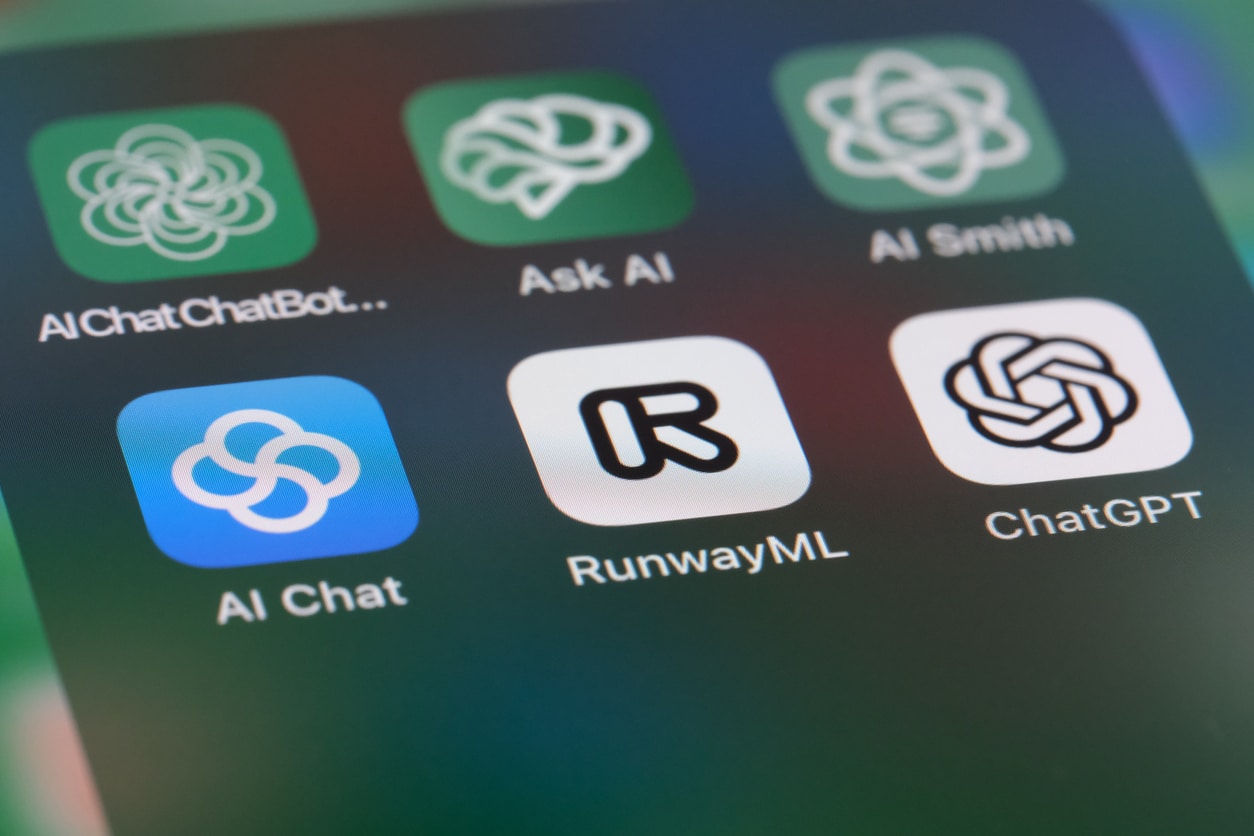
Stay up to date on the latest digital marketing topics.
News & Trends

DMS Explains: Generative AI vs. Human Writers
To understand the discourse around artificial intelligence today, the best place to start is with the century-old folktale of John Henry. John, the story goes, worked for the railroads, hammering holes into rock faces to place sticks of dynamite. One day, John was introduced to a newfangled drilling machine that could do his job more efficiently and without tiring.
This tension—between the indefatigable machine and the strong, proud laborer—resulted in a contest. Side by side with his nemesis, John Henry raced through the mountain tunnel to determine who was superior, man or machine.
John won this contest, of course, but at the cost of his life from exhaustion. Regardless of its sad ending, this story serves as a powerful metaphor even today, at the dawn of the AI age.
But how can the story of John Henry help us understand the role that generative AI tools play in the contemporary digital marketing landscape? What are the advantages and disadvantages of generative AI for content creation?
Finally, if a modern John Henry raced ChatGPT in the creation of a promotional blog or SEO-rich service page, who would win? Let’s find out.
Dapper Market Solutions: Generative AI vs. Human Writers ExplainedDapper Market Solutions Explains Generative AI VS. Human Marketing Writers
At Dapper Market Solutions, we know how turbulent digital marketing can be. No new tech or Google update has been quite as disruptive to content marketing as generative AI.
But is this tech miraculous and life-changing? Or is it simply another tool—like a calculator—to keep in your desk drawer? Let’s dive in.
Generative AI, ChatGPT, & Advantages For Content Creation
Once you cut through the science fiction, you’re left with something we’re all familiar with: software. At its core, ChatGPT uses machine learning to analyze and emulate human-generated written content. There is some debate in the tech community about even calling ChatGPT “artificial intelligence,” but that’s a debate for another time.
Unlike any program before it, ChatGPT is capable of generating convincing writing based on a single prompt. The more complex the prompt, the more suitable the content it creates. If you haven’t played with ChatGPT yet, give it a trytoday.
Google’s answer to ChatGPT (Google Bard) is also enjoying wide use and popularity. But as more and more early adapters get on board with AI tools, they’re discovering limitations, advantages, and some top tips for usage.
Generative AI Advantages For Content Creation
Much like the drilling machine John Henry faced, modern AI tools offer several tremendous advantages over their human counterparts. Here are just a few.
Speed
Let’s start with the first and most obvious advantage: speed. When it comes to quickly composing written content, no human can keep up with ChatGPT or Google Bard. These AI models can generate content of any kind nearly instantly. Better still, they do so without making too many errors and without fatigue.
Grammar
Furthermore, ChatGPT gives a definite leg up to any content creator who may struggle with diction, grammar, syntax, or punctuation. If it’s been too many years since your last English class, you’ll appreciate ChatGPT’s exceptional comma placement and vocabulary.
SEO (Search Engine Optimization)
But what about SEO? Can generative AI models incorporate keywords into written content? The answer here is a “yes” with a “but.”
The free version of ChatGPT is not connected to the internet, so it’s not capable of real-time queries or research. And without a subscription to established keyword databases, most generative AI models can’t be trusted to perform highly accurate keyword research for us.
That said, ChatGPT and other generative AI models draw from a massive database of stored written content to create new language and answer questions. So long as you provide the generative AI with a list of preferred keywords, you can count on some SEO advantages.
Versatility
In its present state, ChatGPT is more than capable of creating numerous passable deliverables, including:
- Blogs
- Landing pages
- Website service pages
- Paid ads
- Print ads
- Newsletters
- Social media posts
- And more
The Disadvantages of Content Creation with Generative AI
As with any new tech, it will take some time to iron out the bugs. The more we engage with machine learning, the better generative AI will be at satisfying our demands.
Hallucinations
Much has been made of ChatGPT’s tendency to “hallucinate.” These incorrect statements can quickly sink the authority we need in our written content. At times, ChatGPT can conflate figures, invent facts, provide wildly inaccurate answers, or otherwise fumble the details in an awkward or misleading way.
Frequent updates have limited these hallucinations, but the damage has been done. Most of us understand these days that—long before hitting the publish button—we need human eyes to review AI writing.
Telling It What You Need
Another drawback centers on the prompts themselves. ChatGPT receives directions through human-written prompts. So, before you get anything out of your generative AI tool of choice, you have to articulate what you want.
For some users, this can be slightly self-defeating. If you struggle to compose written content already, how can you accurately describe your needs in a written format for ChatGPT or Google Bard?
Thankfully, as time goes on, users have both simplified and elaborated on the types of prompts they’ve used to create satisfactory content—getting us all one step closer to automating great results.
Controversial Statements
Other headlines have focused on the ugly human content from which generative AI models sometimes draw. Because these AI tools contain stores of human commentary, they can sometimes share human flaws.
Numerous instances of racist, sexist, or otherwise derogatory language from AI tools have been widely discussed. This issue may be increasingly rare, but it’s certainly something to watch out for.
If you’ve been dreaming of a completely automatic content creation tool, you may have to wait a little while more. For the time being, we should always heavily scrutinize the content generative AI creates.
Human Writers: Challenges & Advantages
For most of recorded (and unrecorded) history, language belonged exclusively to organic life. Bugs, lizards, whales, birds, and other primates can communicate verbally. But thanks to a vast range of precise expressions, human language takes the top prize.
A language like English can be hard to quantify into 0s and 1s. With anywhere from 600K to 1.2 million words in a constantly growing language, vocabulary becomes the first hurdle alongside word choice (diction). After that, abstract concepts (like context and connotation) complicate matters further.
In a manner of speaking, we didn’t invent math so much as discover it. Language, on the other hand, is nonsense to all but the humans who use it. These details add up to give human writers a definite edge when complicated arguments or nuanced messages are needed.
Content Creation Advantages for Human Marketers
Much like John Henry, human marketing writers are proud, capable, and ready to lend a hand in ways that even generative AI systems can’t match.
SEO (Search Engine Optimization)
Human writers have the edge over generative AI models when it comes to SEO best practices. ChatGPT can certainly generate hundreds or even thousands of meta-titles or meta-descriptions, but for composing the body copy, humans are generally preferable.
For starters, human writers understand what sounds natural. Keywords shouldn’t stand out like sore thumbs—they should blend seamlessly into sensible writing. Additionally, there are more keyword factors than meets the eye.
Keywords have intent (commercial, navigational, transactional, informational). Keywords also have a difficulty associated with ranking for them organically (that is: without paying Google for the privilege). Usually expressed as a percentage (0% to 100%), keyword difficulty can make or break an organic campaign. Using only the highest-ranking keywords (for example) is unlikely to produce the best results.
All things considered, there is nuance to SEO that most generative AI models aren’t familiar with. When your campaign needs to meet the right audience at the right point in the sales funnel, you might consider human writers over artificial ones.
Google’s EEAT Update
Let’s switch up our angle for a moment to discuss these issues from Google’s perspective. If you’re trying to create and maintain a vast web of resources from around the globe, it benefits you to verify the information you’re linking to. But Google can’t possibly fact-check the written content on every website in the digital landscape.
To boost the value of results, Google’s EEAT update rewards genuinely helpful, informative, and easy-to-read content. While not a ranking factor in its own right (yet), Google is prioritizing written information that leverages:
- E– Experience
- E– Expertise
- A– Authoritativeness
- T– Trustworthiness
In other words, the appropriateness of written content and the helpfulness it displays could become primary ranking factors moving forward—possibly to the same degree of importance as keywords themselves.
When it comes to giving practical advice, it helps to intuitively know the minds, questions, and concerns of our readers. Generative AI may be intelligent, but it can’t hope to keep up with human writers when intuition is critical.
Nuance & Argument
When we meet someone with abundant charisma, we may say, “They could sell a ketchup popsicle to a woman in white gloves,” or, “They could sell bags of ice in a snowstorm.” Interpersonally, we understand the value that charisma has. So why are we quick to sell charm and empathy up the river when it comes to copywriting?
If you have a product or service that’s easy to understand, you may not need nuance in your sales pitch or your written deliverables. A “problem meets solution” marketing approach is tried and true, after all. But even generative AI models struggle to understand the numerous advantages of electrostatic precipitator maintenance or the many disadvantages of aging electrical panels.
Humans have a baseline of understanding. Our interests, experience, and exposure to common and uncommon knowledge allows us to ask the same questions consumers may have. This intuition also allows us to anticipate consumer disagreement in a way that AI could never hope to match.
The Verdict on Generative AI For Organic Marketing Campaigns
In a contest of speed between a generative AI writer and a human writer, the AI will win. But in a contest of quality, human writers still have an edge. Like a calculator, generative AI writing systems are best when used for quick jobs, rote tasks, and when removing redundant or tiring duties from the plates of human marketers.
That said, we can all look forward to years or even decades of updates, refinements, and newer generative AI models that may be more capable than even our best human writers. Smart marketing agencies and businesses are leveraging both human and AI writers to make the best case for the right audience at the best price point.
At Dapper Market Solutions, we’re combining the efforts of both AI and human writers to maximize efficiency and outcomes. For more breaking news and analysis from the world of digital marketing, check back frequently or contact ustoday!
Ready To Take Your Organic Marketing Campaigns to The Next Level?
As a full-service, Michigan-based digital marketing agency, Dapper Market Solutions keeps its thumb on the pulse of Google’s algorithms, SEO best practices, and generative AI marketing tools. To get and maintain the edge you need, contact a (human) marketing professionalat Dapper today!
Explore More From DMS
The Team, The Team, The Team!

